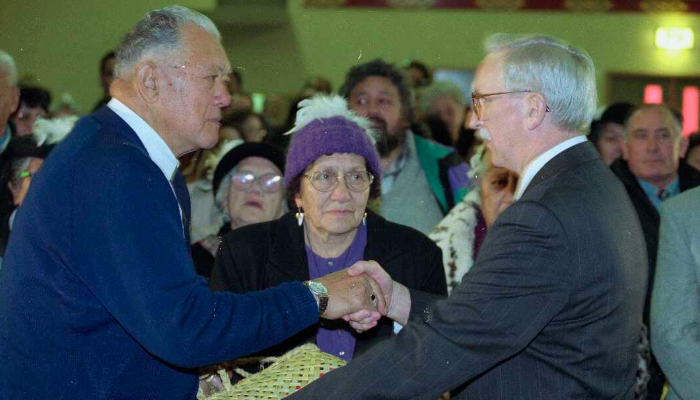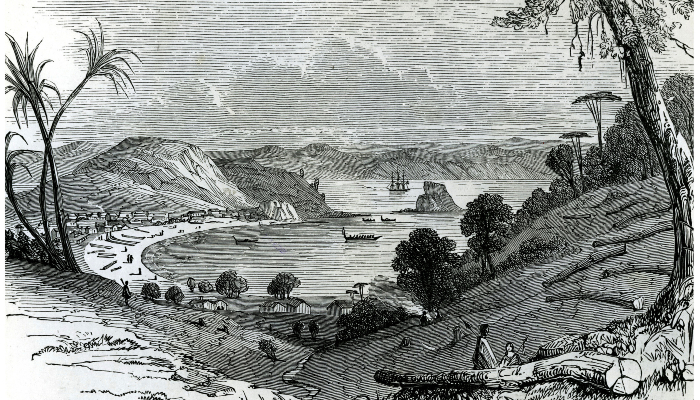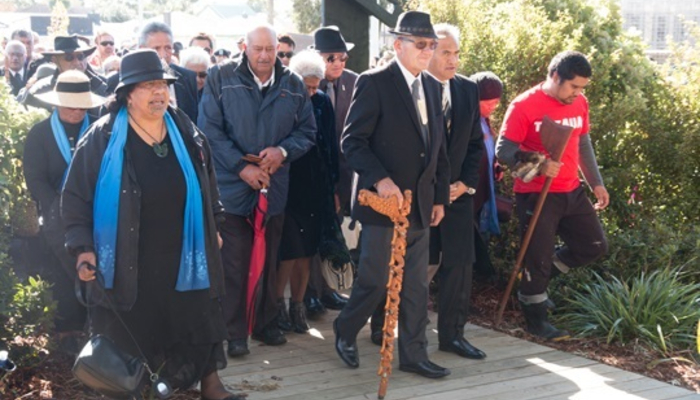Treaty of Waitangi
Where can I find information about the Treaty of Waitangi - Te Tiriti o Waitangi?
(Years 7-10)

Image: Reconstruction of the Signing of the Treaty of Waitangi, Marcus King, from Archives New Zealand on Wikimedia Commons. CC BY 2.0. Image cropped.
Entry last updated: 2/02/26
Introduction
Te Tiriti o Waitangi | the Treaty of Waitangi, was signed on 6 February 1840. Since then, it has been the foundation of the relationship between Māori and Pākehā, shaping the social, cultural, and political landscape of Aotearoa New Zealand.
The history of the Treaty
A good starting point is to find out about the history and background of the Treaty. This will help you understand its significance and why it is important to New Zealand.
This is a great website for information about history in Aotearoa New Zealand. If we go all the way down the page, we can see that the website belongs to the Ministry for Culture & Heritage, so the information is well-researched and reliable.
From the homepage, go to Politics and Government.
Select Treaty of Waitangi to read:
Tips: We like sites that are from New Zealand government organisations, because we can trust the information. Their web address usually has .govt.nz. Or you can look at their About us page.
Treaty of Waitangi Collection (BWB)
The Treaty of Waitangi Collection (BWB) is a part of EPIC, a collection of reliable databases covering lots of different topics. It’s put together especially for New Zealand school students and helps to answer questions like this.
The collection is divided into 3 parts — Foundations, Histories and Commentary.
The eBook An illustrated history of the Treaty of Waitangi by Claudia Orange is an excellent place to read about how the Treaty came about.
Tips: To get to the EPIC resources you will need a password from your school librarian first. Or you can chat with one of our AnyQuestions librarians and they will help you online. Some EPIC databases may also be available through your public library.
Archives New Zealand | Te Rua Mahara o te Kawanatanga
Archives New Zealand is a government website that protects and preserves official records from early 19th century treaties to 21st century documents and data.
Look down the page to the story about the Treaty of Waitangi.
You will find stories on how the Treaty happened, the timeline, who signed the Treaty and different versions.
Make sure to explore the Online resources at the end of the page that have links to useful websites that explain more about the Treaty.
Tips: Many web pages have links to further information or to other recommended sites. Following these links is a great way to find out more.
NZ On Screen is an online showcase of New Zealand television, film and music videos, and is especially useful for NZ history.
Enter the search words 'Treaty of Waitangi' and select the link The Waitangi Collection.
Watch What Really Happened - Waitangi, a 7-part series that covers the days leading up to the signing of the Treaty.
Lost in Translation is another series based on the journey of the 9 sheets and its signatories.
Tips: Websites that have .com or .co in the address can have good information, but you need to assess how reliable it is. Check the About us link on the website, if you can find one. That can tell you what the company’s mission and values are.
Waitangi Day celebrations
Waitangi Day is celebrated on 6 February each year. This is a public holiday in New Zealand and often includes speeches, ceremonies and re-enactments.
There is information about Waitangi Day celebrations on NZ History and how celebrations have changed over the years. This website breaks it down decade by decade so you can see how it has evolved, and what it is like today.
Go to Politics and Government to find the link on the Treaty of Waitangi.
Next, select Waitangi Day.
Waitangi Treaty Grounds host celebrations on Waitangi Day and throughout the year.
Use the Visit tab to find Waitangi Day to read about commemoration and activities on 6 February.
You will also find a link to education Resources to help you delve deeper into the story of Waitangi, and Te Tiriti | The Treaty.
Tips: Websites with .org in the address can have good information but you need to assess how reliable it is. Click on the About Us link. We like this website because it is supported by the Waitangi National Trust, and you can find out exactly who is part of this organisation and the values that underpin their work.
Christchurch City Libraries has lots of useful pages on New Zealand topics such as Waitangi Day celebrations.
Go to the box called Search the and select website from the drop-down box.
Enter 'Waitangi Day' into the search box to find the link called Waitangi Day — Treaty Zone for kids.
Read the link about the 1976 Waitangi Day Act and resources on how to celebrate this day.
Tips: We like articles from Christchurch City Library because they are researched and written by librarians, so the information will be reliable.
The Treaty today
There is ongoing discussion and debate about how the Treaty should affect New Zealand society, and how the principles can be upheld in law and government policy. One major concern has been Māori rights to land and natural resources, and how these rights have not been respected in the past.
Te Ara: The Encyclopedia of New Zealand
Te Ara is an excellent starting point for all questions about Aotearoa New Zealand. If we scroll down to the bottom of the page, we can see that the website belongs to the Ministry for Culture & Heritage, so the information is well-researched and reliable.
Go to the Sitemap, then look down the page for Section: Government and Nation.
Select the link Te Tiriti — the Treaty.
Choose Ngā whakataunga Tiriti — Treaty of Waitangi settlement process to find out about the process to fix the injustice caused by governments breaking the Treaty.
You can also choose the story Waitangi Tribunal — Te Rōpū Whakamana to learn about the Waitangi Tribunal.
Te Ara also has information about the foreshore and seabed debate and how it relates to the Treaty of Waitangi.
Search the website using the keywords 'foreshore and seabed'.
Find the full story Law of the foreshore and seabed.
Tips: Te Ara is a reliable and trustworthy government website about New Zealand history, people, environment and culture.
Te Tai Treaty Settlement Stories
This is a digital storytelling programme on Te Ara that explores the Treaty of Waitangi | Te Tiriti o Waitangi settlements and their impact. It is a mix of articles, videos, and pictures. The website can be viewed in English or Te reo Māori.
Go to Treaty settlement stories to find out what they are.
You could also explore videos from iwi and kaupapa settlement stories.
Under the About tab, select Treaty settlements to read why they are needed.
This is the official website of the Waitangi Tribunal. There is information here about how the Tribunal works and how it interacts with the Treaty of Waitangi.
Go to About and under The Treaty find Māori and English Text.
This page also has a contemporary English translation.
Go to Claims.
Choose Claims process to find out about the process for submitting a claim, which includes registering and applying for funding.
Tips: We like the Waitangi Tribunal website because it comes from a government organisation. If we go to the bottom of the page we can see that the website belongs to the Ministry of Justice.
This is a good place to look for news and opinions about New Zealand topics in recent times. There are speeches, press releases from government departments, and statements from other organisations.
Search for 'Treaty of Waitangi' - this will bring up lots of results!
You can sort the results by date or by relevance.
Tips: Some websites have .au, .nz, .uk or other codes in their url. This can tell you which country this website comes from eg .au is from Australia or .nz is from New Zealand. You can check the ‘About Us’ link on the website for more information.
He Tohu (‘the signs’) is an exhibition at the National Library of New Zealand in Wellington. It is about three documents that shaped Aotearoa. One of them is the Treaty of Waitangi.
Explore the information and videos about 1840 Te Tiriti o Waitangi - Treaty of Waitangi from this link from the exhibition.
Books
Check your local or school library for these books, and ask your librarian for more recommendations.
Waitangi Day: The New Zealand Story: what it is and why it matters by Philippa Werry
The Treaty of Waitangi by Kevin Boon
The Treaty of Waitangi by Ross Calman
Our treaty: the treaty of Waitangi 1840 to the presentby Ruth Naumann
An illustrated history of the Treaty of Waitangi by Claudia Orange
The Story of a Treaty by Claudia Orange
Healing our history: the challenge of the Treaty of Waitangi by Robert Consedine and Joanna Consedine.
SCIS no: 1832258
Topics covered
Related content

Decl. of Independence NZ
Where can I find information about He Whakaputanga o te Rangatiratanga – The Declaration of Independence?

Holidays (New Zealand)
Where can I find information about public, local and school holidays in New Zealand?

Waitangi Tribunal
Discover resources related to the Waitangi Tribunal.

New Zealand wars
Where can I find information about the New Zealand Wars during the 1840s to 1870s?

Government (New Zealand)
Where can I find information about the New Zealand government system?

Māori Land March 1975
Where can I find information about the Māori Land March in 1975?

He Whakaputanga 1835
Discover resources related to He Whakaputanga | Declaration of Independence.

Kiingitanga (Māori King movement)
Where can I find information about Kiingitanga – the Māori King movement?
